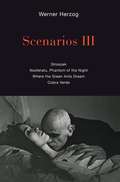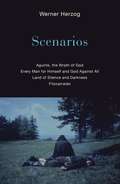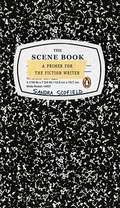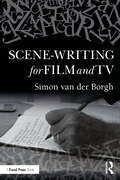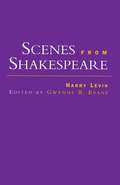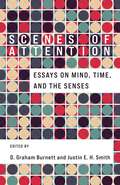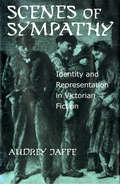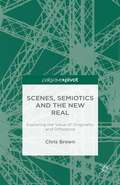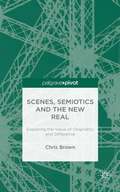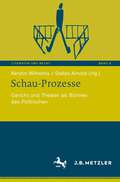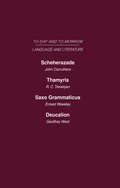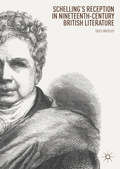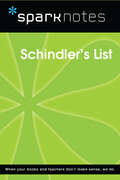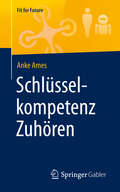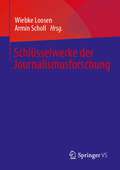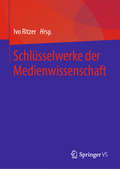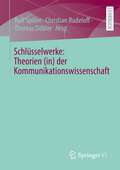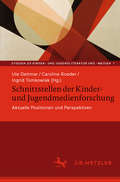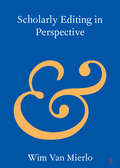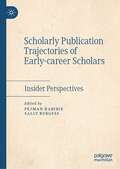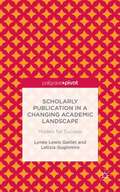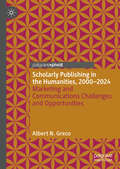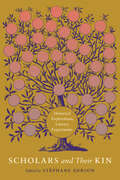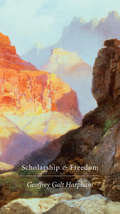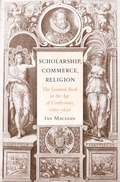- Table View
- List View
Scenarios III: Stroszek; Nosferatu, Phantom of the Night; Where the Green Ants Dream; Cobra Verde
by Werner HerzogFor the first time in English, and in his signature prose poetry, the film scripts of four of Werner Herzog&’s early works &“Herzog doesn&’t write traditional scripts,&” Film International remarked of the master filmmaker&’s Scenarios I and II. &“Instead, he writes scenarios which are like a hybrid of film, fiction, and prose poetry.&”Continuing a series that Publishers Weekly pronounced &“compulsively readable . . . equal parts challenging and satisfying, infuriating and enlightening,&” Scenarios III presents, for the first time in English, the shape-shifting scripts for four of Werner Herzog&’s early films: Stroszek; Nosferatu, Phantom of the Night; Where the Green Ants Dream; and Cobra Verde. We can observe Herzog&’s working vision as each of these scenarios unfolds in a form often dramatically different from the film&’s final version—as, in his own words, Herzog works himself up into &“this kind of frenzy of high-caliber language and concepts and beauty.&”With Scenarios I and II, this volume completes the picture of Herzog&’s earliest work, affording a view of the filmmaker mastering his craft, well on his way to becoming one of the most original, and most celebrated, artists in his field.
Scenarios: Aguirre, the Wrath of God; Every Man for Himself and God Against All; Land of Silence and Darkness; Fitzcarraldo
by Werner HerzogI do not follow ideas, I stumble into stories or into people; and I know that this is so big, I have to make a film. Very often, films come like uninvited guests, like burglars in the middle of the night. They are in your kitchen; something is stirring, you wake up at 3 a.m. and all of a sudden they come wildly swinging at you.When I write a screenplay, I write it as if I have the whole film in front of my eyes. Then it is very easy for me, and I can write very, very fast. It is almost like copying. But of course sometimes I push myself; I read myself into a frenzy of poetry, reading Chinese poets of the eighth and ninth century, reading old Icelandic poetry, reading some of the finest German poets like Hölderlin. All of this has absolutely nothing to do with the idea of my film, but I work myself up into this kind of frenzy of high-caliber language and concepts and beauty.And then sometimes I push myself by playing music, for example, a piano concerto by Beethoven, and I play it and write furiously. But none of this is an answer to the question of how you focus on a single idea for a film. And then, during shooting, you have to depart from it sometimes, while keeping it alive in its essence. —Werner Herzog, on filmmakingWerner Herzog doesn&’t write traditional screenplays. He writes fever dreams brimming with madness, greed, humor, and dark isolation that can shift dramatically during production—and have materialized into extraordinary masterpieces unlike anything in film today. Harnessing his vision and transcendent reality, these four pieces of long-form prose earmark a renowned filmmaker at the dawn of his career.
Scene Book, The
by Sandra ScofieldA treasure-trove of scene-writing wisdom from award-winning author and teacher Sandra Scofield To write a good scene, you have to know the following: Every scene has an EVENT Every scene has a FUNCTION in the narrative Every scene has a STRUCTURE: a beginning, middle, and end Every scene has a PULSE The Scene Book is a fundamental guide to crafting more effective scenes in fiction. In clear, simple language, Sandra Scofield shows both the beginner and the seasoned writer how to build better scenes, the underpinning of any good narrative. .
Scene-writing for Film and TV
by Simon van der BorghFocusing on an integral aspect of screenplays, this book takes students and writers at all levels through the process of understanding and writing better scenes. It interrogates the functions of a scene and how writers can then apply this knowledge to their own film and television scripts. Author Simon van der Borgh familiarises the screenwriter with the fundamental aspects of a scene, looking at what a scene is, the characters involved, the action depicted, dialogue, setting, and style. Featuring original scenes which show the practice of scene-writing and the application of ideas and approaches alongside in-depth analysis and critique, the book explores the process and approach to scene-writing and how to learn and improve methods of telling dynamic, engaging and moving stories of diverse types and formats on screen. With a strong focus on practice-based advice, the book includes exercises at every step to enable writers to build on and extend their knowledge and skills with confidence and clarity chapter by chapter. Exploring the film and TV scene with its different types, forms, and functions, it is the ideal book for aspiring screenwriters and students of screenwriting and filmmaking at all levels, as well as directors, producers and actors looking to better understand the contextual and sub-textual motivations intended by the writer.
Scenes from Shakespeare (Comparative Literature and Cultural Studies #7)
by Harry LevinFirst published in 2000. Routledge is an imprint of Taylor & Francis, an informa company.
Scenes of Attention: Essays on Mind, Time, and the Senses
by Burnett, D. Graham; Smith, Justin E. H.Are we paying enough attention? At least since the nineteenth century, critics have alleged a widespread and profound failure of attentiveness—to others, to ourselves, to the world around us, to what is truly worthy of focus. Why is there such great anxiety over attention? What is at stake in understanding attention and the challenges it faces?This book investigates attention from a range of disciplinary perspectives, including philosophy, history, anthropology, art history, and comparative literature. Each chapter begins with a concrete scene whose protagonists are trying—and often failing—to attend. Authors examine key moments in the history of the study of attention; pose attention as a philosophical problem; explore the links between attention, culture, and technology; and consider the significance of attention for conceptualizations of human subjectivity. Readers encounter nineteenth-century experiments in boredom, ornithologists conveying sound through field notations, wearable attention-enhancing prosthetics, students using online learning platforms, and inquiries into attention as a cognitive state and moral virtue.Amid mounting concern about digital mediation of experience, the rise of “surveillance capitalism,” and the commodification of attention, Scenes of Attention deepens the thinking that is needed to protect the freedom of attention and the forms of life that make it possible.
Scenes of Sympathy: Identity and Representation in Victorian Fiction
by Audrey JaffeIn Scenes of Sympathy, Audrey Jaffe argues that representations of sympathy in Victorian fiction both reveal and unsettle Victorian ideologies of identity. Situating these representations within the context of Victorian visual culture, and offering new readings of key works by Charles Dickens, Elizabeth Gaskell, Ellen Wood, George Eliot, Oscar Wilde, and Arthur Conan Doyle, Jaffe shows how mid-Victorian spectacles of social difference construct the middle-class self, and how late-Victorian narratives of feeling pave the way for the sympathetic affinities of contemporary identity politics. Perceptive and elegantly written, Scenes of Sympathy is the first detailed examination of the place of sympathy in Victorian fiction and ideology. It will redirect the current critical conversation about sympathy and refocus discussions of late-Victorian fictions of identity.
Scenes, Semiotics and The New Real: Exploring the Value of Originality and Difference
by Chris BrownThis book provides a semiotic analysis of 'scenes', powerful vehicles for introducing new ideas, perspectives and behaviours, as a concept. In particular, it examines the types of scene that exist; explores their effectiveness in spreading new ideas; and considers their vital role in introducing originality and difference in modern society.
Scenes, Semiotics and the New Real: Exploring the Value of Originality and Difference
by Chris BrownScenes, Semiotics and the New Real.
Schau-Prozesse: Gericht und Theater als Bühnen des Politischen (Literatur und Recht #8)
by Stefan Arnold Kerstin WilhelmsGerichtsprozesse wie der NSU-Prozess haben große mediale Aufmerksamkeit erfahren und sind zum Stoff von zahlreichen Theaterinszenierungen geworden. Solche publikumswirksamen ‚Schau-Prozesse‘ zeigen, wie Gericht und Theater zu Bühnen des Politischen werden. Dabei wird deutlich, dass Recht und Theater viel fundamentaler verbunden sind, als bislang diskutiert: Sie konstituieren sich gegenseitig. Theatrale Elemente sind für das Recht unverzichtbar und umgekehrt prägen Rechtsinszenierungen das Theater. Die Beiträge des interdisziplinären Bandes analysieren diese Wechselseitigkeit und fokussieren die politische Performance im Theater und im Recht.
Scheherazade or the Future of the English Novel Thamyris or Is There a Future for Poetry? Saxo Grammaticus Deucalion or the Future of Literary Criticism: Today and Tomorrow Volume Twenty-One
by Carruthers, Trevelyan, Weekley, WestScheherazade Or the Future of the English Novel John Carruthers Originally published in 1928 "A brilliant essay…" Daily Herald A survey of contemporary fiction in England and America lends to the conclusion that the literary and scientific influences of the last fifty years have combined to make the novel of today predominantly analytic. The author argues that it has therefore gained in psychological subtlety, but lost its form and how this may be regained is put forward in the conclusion. 90pp Thamyris Or Is There a Future for Poetry? R C Trevelyan Originally published in 1925 "Learned, sensible and very well-written." New Statesman This volume examines the possibilities of development for modern poetry. 90pp Saxo Grammaticus First Aid for the Best-Seller Ernest Weekley Originally published in 1930 "A very shocking collection of vile phrases from contemporary writers." Daily News Authored by the philologist Ernest Weekley, this volume represents the original emergency grammar manual for time-pressed best-selling writers. 88pp Deucalion Or the Future of Literary Criticism Geoffrey West Originally published in 1930 This book discusses the true function of criticism and asks how modern criticism is performing it. 86pp
Schelling’s Reception in Nineteenth-Century British Literature
by Giles WhiteleyThis book examines the various ways in which the German philosopher Friedrich Schelling was read and responded to by British readers and writers during the nineteenth century. Challenging the idea that Schelling’s reception was limited to the Romantics, this book shows the ways in which his thought continued to be engaged with across the whole period. It follows Schelling’s reception both chronologically and conceptually as it developed in a number of different disciplines in British aesthetics, literature, philosophy, science and theology. What emerges is a vibrant new history of the period, showing the important role played by reading and responding to Schelling, either directly or more diffusely, and taking in a vast array of major thinkers during the period. This book, which will be of interest not only to historians of philosophy and the history of ideas, but to all those dealing with Anglo-German reception during the nineteenth century, reveals Schelling to be a kind of uncanny presence underwriting British thought.
Schindler's List (SparkNotes Film Guide)
by SparkNotesSchindler's List (SparkNotes Film Guide) Making the reading experience fun! SparkNotes Film Guides are one-stop guides to great works of film–masterpieces that are the foundations of filmmaking and film studies. Inside each guide you&’ll find thorough, insightful overviews of films from a variety of genres, styles, and time periods. Each film guide contains:Information about the director and the context in which the film was made Thoughtful analysis of major characters Details about themes, motifs, and symbols Explanations of the most important lines of dialogue In-depth discussions about what makes a film so remarkable SparkNotes Film Guides are an invaluable resource for students or anyone who wants to gain a deeper understanding of the great films they know and love.
Schlüsselkompetenz Zuhören (Fit for Future)
by Anke AmesHaben Sie noch ein Ohr fürs Wesentliche? Für Ihre Geschäftspartner, Ihre Kollegen, Ihre Mitarbeiter und nicht zuletzt für Ihr engstes Umfeld? Oder kommunizieren auch Sie schon vorwiegend einseitig über Smartphone, E-Mail und Co? Die zunehmende Digitalisierung und Zeitnot unserer Leistungsgesellschaft erschweren den echten zwischenmenschlichen Austausch.Dieses Buch stellt die häufig unterschätzte und manchmal sogar in Vergessenheit geratene Fähigkeit des Zuhörens in den Fokus. Es zeigt auf, wie echtes Zuhören im Job gelingt und welche Vorteile dies mit sich bringt. Zuhören schafft Verbindung und wird in Zukunft eine der wichtigsten beruflichen Schlüsselkompetenzen werden.Über die Buchreihe "Fit for Future"Die Zukunft wird massive Veränderungen im Arbeits- und Privatleben mit sich bringen. Tendenzen gehen sogar dahin, dass die klassische Teilung zwischen Arbeitszeit und Freizeit nicht mehr gelingen wird. Eine neue Zeit – die sogenannte „Lebenszeit“ – beginnt. Laut Bundesregierung werden in den nächsten Jahren viele Berufe einen tiefgreifenden Wandel erleben und in ihrer derzeitigen Form nicht mehr existieren. Im Gegenzug wird es neue Berufe geben, von denen wir heute noch nicht wissen, wie diese aussehen oder welche Tätigkeiten diese beinhalten werden. Betriebsökonomen schildern mögliche Szenarien, dass eine stetig steigende Anzahl an Arbeitsplätzen durch Digitalisierung und Robotisierung gefährdet sind. Die Reihe „Fit for future“ beschäftigt sich eingehend mit dieser Thematik und bringt zum Ausdruck, wie wichtig es ist, sich diesen neuen Rahmenbedingungen am Markt anzupassen, flexibel zu sein, seine Kompetenzen zu stärken und „Fit for future“ zu werden. Der Initiator der Buchreihe Peter Buchenau lädt hierzu namhafte Experten ein, ihren Erfahrungsschatz auf Papier zu bringen und zu schildern, welche Kompetenzen es brauchen wird, um auch künftig erfolgreich am Markt zu agieren. Ein Buch von der Praxis für die Praxis, von Profis für Profis. Leser und Leserinnen erhalten „einen Blick in die Zukunft“ und die Möglichkeit, ihre berufliche Entwicklung rechtzeitig mitzugestalten.
Schlüsselwerke der Journalismusforschung
by Wiebke Loosen Armin SchollWie in anderen Forschungsfeldern gibt es auch in der Journalismusforschung Schlüsseltexte, die ein Forschungsgebiet erschlossen haben, auf dem weitere Forschung aufbaut. Der Band versammelt solche Schlüsselwerke und stellt sie in Kurzbeschreibungen vor. Zusätzlich werden sie in den Forschungskontext eingebettet und ihre Wirkung auf den weiteren Fortgang der Forschungstradition erläutert. Schließlich werden sie in Bezug auf ihre Bedeutung für aktuelle Fragen und Themen der Journalismusforschung eingeschätzt.
Schlüsselwerke der Medienwissenschaft
by Ivo RitzerDer Band stellt ausgewählte Positionen und zentrale Ideen im disziplinären Rahmen der Medienwissenschaft vor. Schwerpunkte liegen auf medienphilosophischen Ansätzen und einer kulturtheoretischen Perspektive, die sich vor einem dezidiert geisteswissenschaftlichen Horizont konturiert. Dabei versteht der Band sich nicht nur als Handbuch und Nachschlagewerk für Studierende wie Lehrende, er soll vielmehr auch einen eigenen Beitrag zur medienwissenschaftlichen Theoriebildung leisten.
Schlüsselwerke: Theorien (in) der Kommunikationswissenschaft
by Thomas Döbler Ralf Spiller Christian RudeloffDer Band gibt eine kompakte Übersicht zu zentralen Theorien (in) der Kommunikationswissenschaft. Insgesamt werden 28 Schlüsselwerke aus der Mikro-, Meso und Makro-Ebene vorgestellt. Ziel ist es, Studierende und Dozierende in den Stand zu versetzen, ein wesentliches Werk in dessen Kontext zu verstehen und in die jeweilige Fachdiskussion einzuordnen. Darüber hinaus wird in diesem Band die Frage diskutiert, welches analytische und empirische Potenzial von den „Klassikern“ in Zeiten digitaler Kommunikation ausgeht.
Schnittstellen der Kinder- und Jugendmedienforschung: Aktuelle Positionen und Perspektiven (Studien zu Kinder- und Jugendliteratur und -medien #1)
by Ute Dettmar Caroline Roeder Ingrid TomkowiakZwischen Kinder- und Jugendliteratur- und -medienforschung und anderen Fachdisziplinen bestehen zahlreiche Schnittstellen. Von diesen ausgehend, werden in dem Band unterschiedliche Perspektiven und Theorieansätze diskutiert und deren Potential für eine literatur- und kulturwissenschaftlich ausgerichtete Kinder- und Jugendliteratur- und -medienforschung beleuchtet. Die 17 Beiträge stellen grundlegende, theoriegeleitete und methodenreflektierte analytische Zugänge zu verschiedenen Untersuchungsgegenständen und Fragestellungen vor. Dabei geht es zum einen darum, den Standort von Kinder- und Jugendliteratur bzw. -medien als Handlungs- und Symbolsystem im kulturellen Archiv auszuloten. Zum anderen werden Ziele gegenwärtiger Forschung diskutiert sowie Aufgaben und Perspektiven zukünftiger Forschungen zur Kinder- und Jugendliteratur entwickelt.
Scholarly Editing in Perspective (Elements in Publishing and Book Culture)
by Wim Van MierloScholarly Editing in Perspective offers a critical reflection on the theory and methods of textual editing, as a contribution to a wider, comparative understanding of editorial practice. The analysis, written in a cogent, concise and accessible manner, offers an insight into the textual-philosophical principles and foundations of scholarly editing from the beginning of the twentieth century to the new opportunities offered by digital technologies in the twenty-first. Scholarly editing is presented as a process that makes an intervention in the text whereby the editor mediates between competing versions of textuality, authorship, and authority. In analysing the assumptions, beliefs, and critical underpinnings of scholarly editing, this Element provides a new perspective on the standard editorial models within the English tradition, how they have evolved, and how they are adapted for the digital age.
Scholarly Publication Trajectories of Early-career Scholars: Insider Perspectives
by Pejman Habibie Sally BurgessThis edited book addresses the complex topic of writing for scholarly publication by early-career scholars. Drawing on self-study and auto-ethnographic perspectives, a group of international early-career researchers share their personal histories, narratives and first-hand accounts of their scholarly publication practices. The book helps paint a richer and more nuanced picture of the experiences, success stories, failures, and challenges that frame and shape academic trajectories of both Anglophone and English as an additional language (EAL) scholars in writing for publication. This book will be of particular interest to scholars of Applied Linguistics, English for academic purposes (EAP), and second language writing, but it will also be of use to other early-career scholars embarking on their first attempts at writing for publication.
Scholarly Publication in a Changing Academic Landscape: Models for Success
by Lynée Lewis Gaillet Letizia GuglielmoScholarly Publication in a Changing Academic Landscape focuses on ways contingent faculty members can join scholarly conversations by making public the work they are already engaged in and how they might publish their way into increased fulfillment and increased job security. Recognizing that contingent faculty often find few opportunities to enroll in publication courses, take advantage of professional development and mentoring sessions, or find allies and peers within their departments, this volume outline the realities of contingent employment and offers concrete advice for maintaining a research and publishing agenda, even without department support. The authors suggest ways to work within the present system, offering concrete strategies for engaging in professional development opportunities and disseminating research findings.
Scholarly Publishing in the Humanities, 2000-2024: Marketing and Communications Challenges and Opportunities (Marketing and Communication in Higher Education)
by Albert N. GrecoThis book explores the recent history and future directions of scholarly publishing in the humanities in the United States from a marketing and communications perspective. The study draws on statistical surveys and data from a multidude of sources in order to analyze the major challenges confronting the humanities in higher education as well as the opportunities for print and digital publication since 2000. Chapters cover all types of publishing from university to trade presses, libraries, national programs, and self publishing, and focuses on changes in higher education funding, the impact of disruptive technologies such as AI, and the importance of global markets in disseminating new research in the humanities. The author explores these trends and other relevant theories, practices, and examples to achieve a better understanding of why publishing scholarly books and journals in the humanities is, and will remain, a critically important yet complicated component of the higher education landscape.
Scholars and Their Kin: Historical Explorations, Literary Experiments
by Stéphane GersonSpotlights historians who have embraced the methodological, practical, and ethical challenges of writing about the most slippery of subjects: their own families. Historians have often been discouraged from writing about their relatives, subjects who are deemed too close for objective analysis. But new work by scholars interested in their own families raises fascinating questions about subjectivity—and how historians might put it to use. It also invites historians to abandon traditional aspects of academic writing and draw, instead, on literary forms more equipped to highlight the relationships between scholar and material, feeling and reason. Scholars and Their Kin embraces diverse approaches to such writing, bringing into the open the personal, professional, and historiographic complexities that ensue when scholars write intimate yet self-aware histories about their families. The first book devoted to this genre, which editor Stéphane Gerson terms “personal family history,” this anthology features ten essays and an afterword by scholars working in this vein. The contributors—varied in their disciplines, themes, and nationalities—reflect on their motivations and methodological choices, the politics of family history, and the institutional constraints they have sometimes faced. Making full use of the creative possibilities of voice and form, they expand the literary ambitions of personal family history, provide readers with narrative models, and address questions of shame, responsibility, love, gendered and racial violence, family archives, as well as the tall tales, myths, misrepresentations, memories, and omissions that suffuse family lives. Scholars and Their Kin will interest historians, scholars in other disciplines, and readers interested in family histories that open broader worlds.
Scholarship and Freedom
by Geoffrey Galt HarphamA powerful and original argument that the practice of scholarship is grounded in the concept of radical freedom, beginning with the freedoms of inquiry, thought, and expression. Why are scholars and scholarship invariably distrusted and attacked by authoritarian regimes? Geoffrey Galt Harpham argues that at its core, scholarship is informed by an emancipatory agenda based on a permanent openness to the new, an unlimited responsiveness to evidence, and a commitment to conversion. At the same time, however, scholarship involves its own forms of authority. As a worldly practice, it is a struggle for dominance without end as scholars try to disprove the claims of others, establish new versions of the truth, and seek disciples. Scholarship and Freedom threads its general arguments through examinations of the careers of three scholars: W. E. B. Du Bois, who serves as an example of scholarly character formation; South African Bernard Lategan, whose New Testament studies became entangled on both sides of his country’s battles over apartheid; and Linda Nochlin, whose essay “Why Have There Been No Great Women Artists?” virtually created the field of feminist art history.
Scholarship, Commerce, Religion
by Ian MacleanA decade ago in the Times Literary Supplement, Roderick Conway Morris claimed that almost everything that was going to happen in book publishing-from pocket books, instant books and pirated books, to the concept of author’s copyright, company mergers, and remainders-occurred during the early days of printing. Ian Maclean’s colorful survey of the flourishing learned book trade of the late Renaissance brings this assertion to life. The story he tells covers most of Europe, with Frankfurt and its Fair as the hub of intellectual exchanges among scholars and of commercial dealings among publishers. The three major religious confessions jostled for position there, and this rivalry affected nearly all aspects of learning. Few scholars were exempt from religious or financial pressures. Maclean’s chosen example is the literary agent and representative of international Calvinism, Melchior Goldast von Haiminsfeld, whose activities included opportunistic involvement in the political disputes of the day. Maclean surveys the predicament of underfunded authors, the activities of greedy publishing entrepreneurs, the fitful interventions of regimes of censorship and licensing, and the struggles faced by sellers and buyers to achieve their ends in an increasingly overheated market. The story ends with an account of the dramatic decline of the scholarly book trade in the 1620s, and the connivance of humanist scholars in the values of the commercial world through which they aspired to international recognition. Their fate invites comparison with today’s writers of learned books, as they too come to terms with new technologies and changing academic environments.
